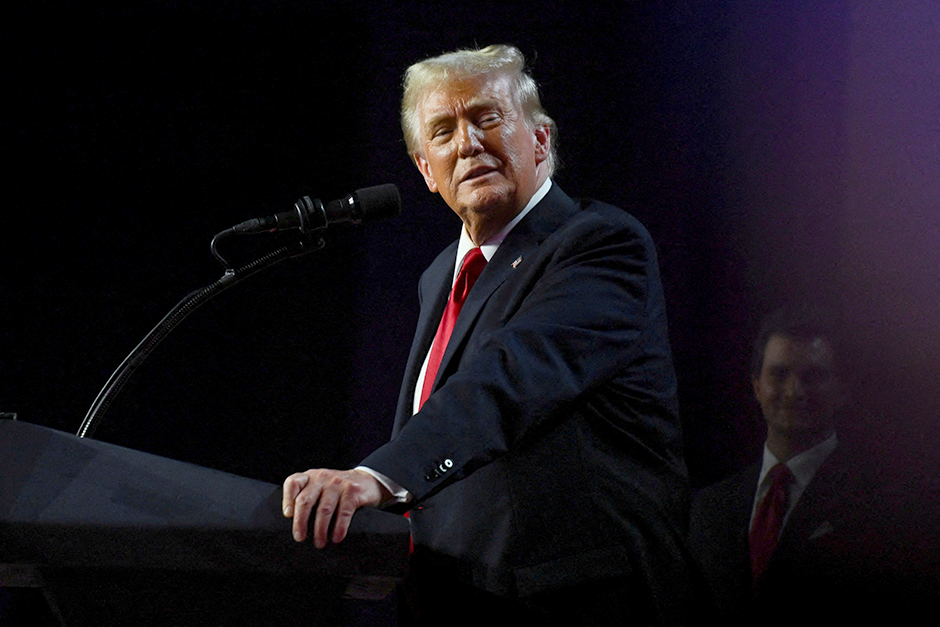WASHINGTON – The Trump administration’s freeze on federal grants and aid to states, local governments and nonprofits will likely touch the lives of many Minnesotans as money for hundreds of programs – from road construction to Meals on Wheels – has stopped or been rescinded.
It also threatens to upend attempts by state and local governments to implement planned budgets, as money they had counted on receiving from Washington, D.C., has suddenly disappeared.
“Minnesota will do what we can to keep the lights on, but we cannot fill the nearly $2 billion hole this will put in the state’s budget each month,” Gov. Tim Walz said. “This isn’t conservatism. This is amateur-hour cruelty.”
Minnesota on Tuesday joined 22 other Democratic states in immediately filing a lawsuit to stop the federal freeze, saying it was an unconstitutional violation of the Administrative Procedures Act, a federal law that governs how federal agencies create and enforce rules. And later Tuesday, a federal judge temporarily blocked the funding pause.
The freeze started in a two-page memo from the Office of Management and Budget saying a review of $3 trillion in federal spending was needed to bring a vast number of programs in line with President Trump’s priorities, citing a number of executive orders on immigration, diversity, equity and inclusion policies (DEI) and foreign aid.
The memo did not say how long this review would take or how long the freeze would last. It stops work on many state and local transportation projects and puts a halt to a slew of government programs, including food stamps, heating assistance, Head Start, policing grants and funding to the state’s tribal governments.
Medicaid funding, which represents the largest pot of money the state receives from the federal government, is also considered vulnerable.
At a Tuesday afternoon press conference at the St. Paul Eastside YMCA’s child care center, Minnesota Commissioner of Management and Budget Erin Campbell said her office tried to draw down more than $400 million from the state’s federal Medicaid account and was unable to do so Tuesday morning. But Campbell said her agency was able to access the funds later in the day. Other states also reported trouble drawing down Medicaid funding on Tuesday. The larges portion of Walz’s $2 billion monthly figure is Medicaid, but also included is about $850 million for other federal programs.
The lawsuit Minnesota joined against the Trump administration also alleges the OMB has violated the separation of powers doctrine and Congress’ authority over the federal budget. Filed in federal court in California, the lawsuit seeks an immediate temporary court injunction on the funding freeze.
“And it’s putting vulnerable people at risk,” Minnesota Attorney General Keith Ellison said at the press conference at the YMCA. “Messing around with federal funding is a very big deal.”
“I do not sit around looking for ways to sue Donald Trump,” Ellison added. “But in the eight days he’s been in office he’s forced me to figure out ways to sue him almost every day.”
Walz said he had not received any kind of guidance from OMB on how the freeze would impact the state and called it an “illegal power grab.” He also said it would be difficult to “backfill” with state funding all of the programs that will lose federal funds.
The governor said if Medicaid was included in the freeze, the state would lose $1.9 billion a month, and more than $800 million a month if Medicaid funding was continued.
Democratic Sen. Tina Smith said reports of the freeze had an immediate effect.
“I’ve heard from community health centers in Minnesota who are already looking at layoffs by the end of the day. May not be able to make payroll at the end of the week,” Smith posted on Bluesky. “Republicans need to grow a spine here. This isn’t a game, it’s people’s lives.”
Smith added in an emailed statement that “the impact of this funding freeze is so massive it’s impossible to comprehend.”
“We are talking about programs that really, really matter to people. Programs that are life or death for Minnesotans. Anyone who relies on LIHEAP to heat their homes in the winter, or anyone who gets dialysis through Medicaid — this puts their lives and well-being at risk. And that’s just the tip of the iceberg,” Smith said.
In a post on X, Rep. Angie Craig said she had heard from two cities in her district that they had been notified their Justice Department grants to local law enforcement agencies had been put on hold.
“Withholding critical funding approved by Congress to hire police officers makes #MN2 communities less safe,” Craig said.
Republicans on Tuesday defended Trump’s actions and said “worthy” projects would be spared cuts or elimination.
“We are 36 trillion dollars in debt, largely because of wasteful spending in Washington on things we don’t want and can’t afford,” said Rep. Pete Stauber, R- 8th District, in a post on X. “Rest assured, this pause on federal funding will be lifted on worthy projects, many of which I fought for in the Northland. This is good governance and what the American people voted for!”
Rep. Tom Emmer, R-6th District, who like most House Republicans is attending a retreat at Trump’s south Florida Doral Golf Club, told reporters the president was “doing exactly what he was elected to do,” and that was to “shake up the status quo.”
But Democrats angrily denounced Trump’s move to impound federal funds.
“This unprecedented and unconstitutional move is causing chaos and jeopardizing critical support for everything from pediatric cancer research to equipment for our first responders,” Sen. Amy Klobuchar said in a statement.
Rep. Betty McCollum, D-4th District, a senior member of the House Appropriations Committee, said the phones in her Capitol Hill and St. Paul offices were “ringing off the hook” with calls from hospital administrators, community health centers, nonprofits, and “Minnesotans who are scared that they will not have the federal assistance they rely on.”
The uncertainty prompted by the unexpected federal action led Senate Majority Leader Erin Murphy, DFL-St. Paul, to say “this extreme executive order throws our existing and future budgets into jeopardy.”
“The short-term effect throws states, communities, schools, hospitals and households into uncertainty and fear,” Murphy added in her statement. “Long term, if cuts of even a fraction of this magnitude were implemented, the costs to individuals and families would be devastating.”
Meanwhile, state Senate Finance Committee co-chair Eric Pratt, R-Prior Lake, downplayed the impact of the OMB’s action.
“I expect we will get more clarity and guidance to help the state fulfill the request on today’s memo. We also need to be sure that vital programs are uninterrupted, and this should be a fairly easy task to meet within the timeline given,” Pratt said in a statement. It’s unclear what timeline he was referring to.





